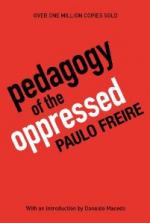
|
| Name: _________________________ | Period: ___________________ |
This test consists of 15 multiple choice questions and 5 short answer questions.
Multiple Choice Questions
1. In what school of thought can the ideas of the book be placed?
(a) Fascism.
(b) Totalitarianism.
(c) Theology.
(d) Critical theory.
2. What is a critical consciousness?
(a) A high achiever.
(b) An overly suspicious mind.
(c) An overly argumentative person.
(d) A view that questions everything around itself.
3. Who was Paulo Friere?
(a) A British subvert.
(b) An American academic.
(c) A Russian revolutionary.
(d) A Brazilian teacher, socialist and educator.
4. Why does Frier use the example of Mr. Giddy?
(a) As an example of fully humanized thinking.
(b) As an example of critical thinking.
(c) As an example of one of the Oppressed.
(d) As examples of Oppressive thinking.
5. Why are power structures necessarily bad, according to Friere?
(a) Because those at the top always turn into dictators.
(b) Because they cost a lot to maintain.
(c) Because those at the bottom express unthinking loyalty.
(d) Because they always have the weak at the bottom and the strong at the top.
6. What is propaganda?
(a) A type of philosophy.
(b) The spread of state-sponsored lies, views or opinions.
(c) A type of society.
(d) A type of school.
7. In what way is pedagogy transmitted to the next generation, according to the author?
(a) Through education and the media.
(b) Through churches.
(c) Through self-learning.
(d) Through television adverts.
8. What, in the author’s estimation, is a critical consciousness?
(a) A mind that never questions anything.
(b) The ability to question everything rationally.
(c) A very important individual.
(d) A form of mental illness.
9. What is the goal of critical consciousness?
(a) To become the best in society.
(b) To become fully humanized.
(c) To lead a revolution.
(d) To be the perfect worker at your job.
10. What is tyranny?
(a) A power-hungry ruler.
(b) A system where everyone shares the wealth.
(c) A type of lizard.
(d) A type of education system.
11. What is Philosophy?
(a) The study of art.
(b) The study of history.
(c) The study of knowledge.
(d) The study of music.
12. What does it mean to be one of the oppressed?
(a) Oppression means you are incarcerated.
(b) Oppression means you live under occupation.
(c) Oppression means you live with the threat of death.
(d) Oppression means your freedoms, wants and desires are curtailed by others who hold power over your actions.
13. What does it mean to be an actualized or fully humanized human being, according to Friere?
(a) To be enlightened.
(b) To be of democratic voting age.
(c) To possess true freedom of thought.
(d) To follow a particular system of thought.
14. What is an a-priori truth?
(a) A fundamentally correct and undeniable truth.
(b) A truth that is hidden an very few people know.
(c) A fraudulent truth.
(d) A truth that everyone knows.
15. What is a 'culture of oppression' according to Friere?
(a) When entire societal views, media and beliefs that are based around maintaining class structure.
(b) American Senate system.
(c) Televisual society.
(d) European government.
Short Answer Questions
1. What is Marxism?
2. When was this book written?
3. Who was Karl Marx?
4. What is a revolutionary?
5. Who was Mr. Giddy?
|
This section contains 548 words (approx. 2 pages at 300 words per page) |

|




